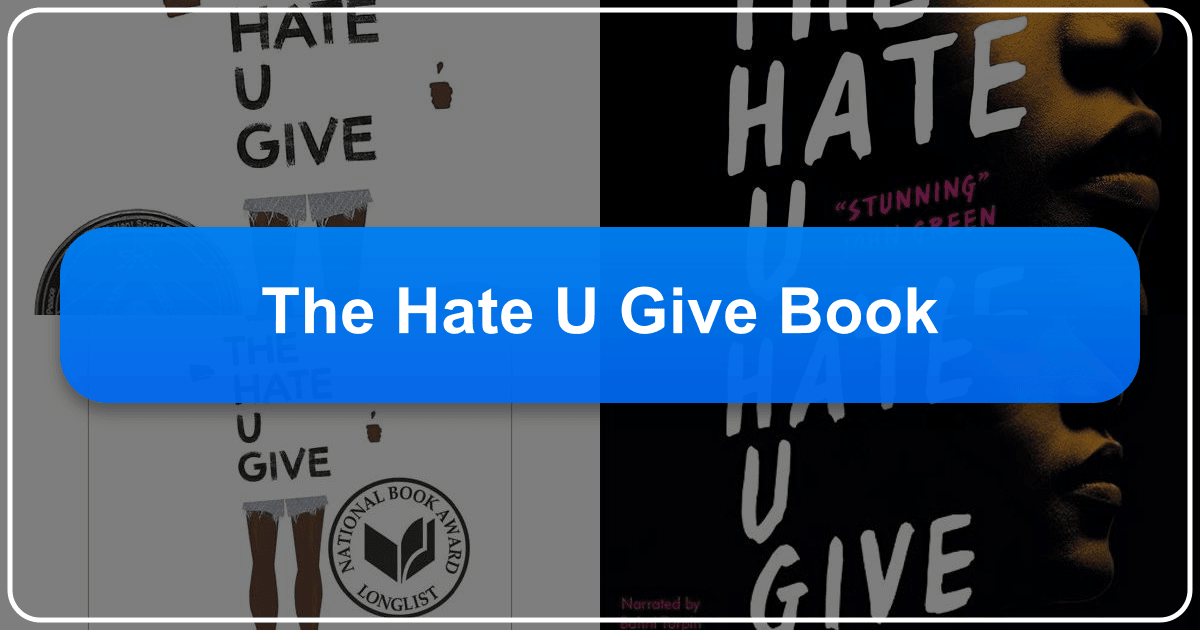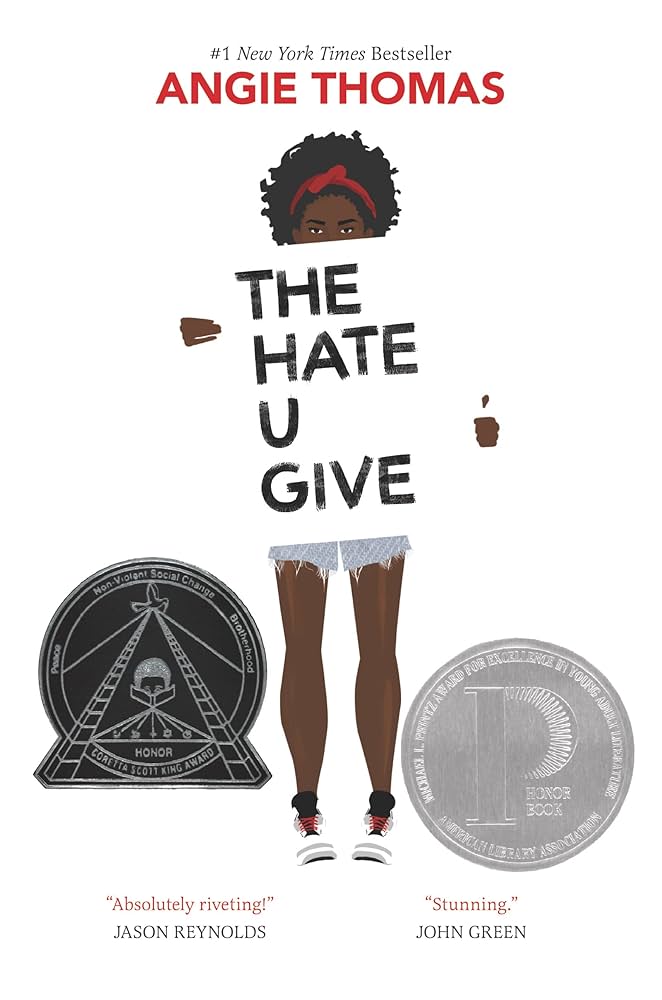The Hate U Give: A Comprehensive Look at the Book and its Impact

Angie Thomas’s The Hate U Give is a young adult novel that has resonated deeply with readers and critics alike. Its exploration of race, police brutality, and the Black Lives Matter movement has sparked crucial conversations and earned it widespread acclaim, including numerous awards and adaptations. This article will delve into various aspects of the book, examining its literary merit, authorial background, and cultural impact, using the framework of common book website topics.

I. Books: Genre, Classification, and Reception
The Hate U Give falls primarily into the Young Adult (YA) fiction genre, specifically addressing social and family issues within the context of contemporary realistic fiction. While firmly rooted in the YA space due to its protagonist’s age and relatable coming-of-age themes, its mature subject matter and compelling narrative have garnered significant interest from adult readers as well. Its classification extends beyond simple genre labels; it’s a powerful social commentary novel, a gripping thriller, and a poignant exploration of grief and identity.
The novel’s success is reflected in its extensive list of accolades. It’s a #1 New York Times bestseller, a Printz Honor Book, a Coretta Scott King Honor Book, and a winner of the Walter Dean Myers Award, among many others. These awards highlight the book’s literary merit and social importance, establishing it as a significant work in contemporary YA literature. Numerous starred reviews from publications like Kirkus, Publishers Weekly, and Booklist further attest to its quality and impact. Online book reviews on sites like Lbibinders.org consistently praise its authentic portrayal of a teenage girl navigating complex social issues, its gripping plot, and its message of social justice. The overwhelmingly positive reception solidifies The Hate U Give’s place as a modern YA classic.

II. Authors: Angie Thomas and Her Influences
Angie Thomas, the author of The Hate U Give, hails from Jackson, Mississippi. Her background as a former teen rapper significantly shaped her writing style, infusing her narratives with a vibrant, authentic voice. This unique perspective, combined with her formal education in creative writing from Belhaven University, allows her to seamlessly blend powerful social commentary with compelling storytelling.

Thomas’s inspiration for The Hate U Give stemmed from a real-life incident involving the shooting of an unarmed Black teenager. This deeply affected her, prompting her to explore the systemic issues underlying such tragedies. Her experiences growing up in a predominantly Black community in Mississippi and the sociopolitical realities of race in America permeate her work. Her writing reflects the challenges faced by marginalized communities, offering both a critical analysis of these problems and a celebration of resilience. The success of The Hate U Give has earned her a place as a leading voice in contemporary literature, showcasing the power of personal experience in driving powerful narratives.
II.A. Angie Thomas’s Writing Style
Thomas employs a first-person narrative, allowing readers intimate access to Starr Carter’s thoughts, feelings, and experiences. This technique fosters a powerful connection between the reader and the protagonist, making Starr’s journey both relatable and emotionally impactful. The language is authentic to Starr’s age and background, capturing the nuances of her speech and the culture she inhabits. While some critics might initially find the vernacular challenging, many see it as an essential element contributing to the story’s realism and authenticity. It’s a testament to Thomas’s skill that she uses language to both reveal character and to drive the plot.
III. Reading and Learning: Themes, Lessons, and Engagement
The Hate U Give presents several key themes that contribute to its educational value and its lasting impact. The novel explores the complexities of racial identity, examining the different ways Starr experiences her identity in her predominantly Black neighborhood and her primarily white prep school. The book tackles the devastating reality of police brutality against unarmed Black individuals, prompting reflection on systemic racism and the justice system’s failures. It highlights the importance of finding your voice and speaking up against injustice, even in the face of fear and intimidation.
The educational value of The Hate U Give lies in its ability to initiate critical thinking and dialogue. The novel prompts readers to confront uncomfortable truths about systemic racism and its consequences, challenging preconceived notions and promoting empathy. It serves as a powerful teaching tool in classrooms and community settings, sparking discussions about race, social justice, and activism. Furthermore, the character arcs within the novel offer invaluable life lessons about friendship, family, identity, and resilience, highlighting the importance of community and support in the face of adversity. The book’s ability to connect with readers on both an emotional and intellectual level makes it a powerful and enriching reading experience, one that fosters critical reflection and personal growth. Readers on sites such as Lbibinders.org discuss the novel’s enduring power to promote conversations and encourage meaningful engagement with these crucial social issues.
III.A. Life Lessons from The Hate U Give
Beyond its compelling narrative, The Hate U Give offers several crucial life lessons:
- The Importance of Empathy and Understanding: The novel forces readers to step into Starr’s shoes, experiencing the world from the perspective of a Black teenager navigating systemic racism. This fosters empathy and a deeper understanding of the challenges faced by marginalized communities.
- The Power of Voice and Activism: Starr’s journey highlights the courage required to speak up against injustice. The novel encourages readers to find their own voice and engage in activism, however small, to create positive change.
- The Strength of Family and Community: The strong bonds of Starr’s family and community provide support and guidance in difficult times. This reinforces the importance of human connection and collective action in overcoming adversity.
- The Complexity of Identity: Starr’s experience navigating two very different worlds exposes the complexities of identity formation and the pressures to conform to societal expectations.
- The Persistence of Systemic Issues: The novel starkly reveals the enduring nature of systemic racism and police brutality, underscoring the need for ongoing awareness, education, and advocacy.
IV. Libraries and Accessibility: Physical and Digital Formats
The Hate U Give is widely available in various formats across different libraries and online retailers. Public libraries carry physical copies, making the book accessible to a broad range of readers. Digital libraries, such as those accessible through Lbibinders.org, provide e-book versions for convenient online access. The book’s popularity has ensured its presence in many school and university library systems, cementing its role in the education of young adults. The book’s accessibility through multiple formats facilitates its widespread reach and influence, ensuring its enduring legacy as a tool for education and social discourse. The book’s various formats, including audiobook, hardcover, paperback, ebook and large print editions, cater to different reading preferences and needs.
V. Cultural Impact: Adaptations, Awards, and Communities
The Hate U Give’s impact extends far beyond its pages. Its powerful message has generated significant cultural conversation, leading to a major motion picture adaptation starring Amandla Stenberg. This film adaptation further amplified the book’s reach, exposing its themes to a wider audience and sparking renewed interest in the novel’s powerful message. The film’s success, alongside the book’s numerous awards, established The Hate U Give as a significant work of contemporary literature and popular culture. The novel has also fostered strong online communities where readers share their thoughts, experiences, and interpretations of the book. These discussions further extend its influence, building awareness of its themes and promoting continued engagement with important social issues. This demonstrates the book’s versatility as a powerful tool for driving social commentary and promoting engagement with social justice. The ongoing conversations and continued relevance of the novel’s themes indicate a powerful and lasting cultural impact. Sites like Lbibinders.org can be important spaces for these communities to share, analyze, and celebrate the significance of The Hate U Give.
V.A. Literary Influence
The Hate U Give has significantly influenced contemporary YA literature. Its success has demonstrated the strong demand for diverse and inclusive narratives that address important social issues. The book’s open exploration of race and inequality has opened the door for subsequent books to tackle similarly challenging topics, showcasing the power of literature to drive positive change in society. Its success has inspired a wave of YA fiction that takes on challenging themes, promoting social justice and cultural understanding.
In conclusion, The Hate U Give is more than just a young adult novel; it’s a cultural phenomenon that has sparked critical conversations and made a lasting impact on society. Its literary merits, authorial vision, accessible format, and powerful message combine to create a work of undeniable importance in both the world of literature and its wider sociopolitical context.